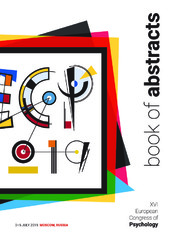| dc.creator | Stojadinović, Irena | |
| dc.creator | Bjekić, Jovana | |
| dc.creator | Vukčević Marković, Maša | |
| dc.date.accessioned | 2023-11-25T22:03:41Z | |
| dc.date.available | 2023-11-25T22:03:41Z | |
| dc.date.issued | 2019 | |
| dc.identifier.isbn | 978-5-19-011419-5 | |
| dc.identifier.uri | https://ecp2019.ru/doc/Book_of_Abstracts_ecp_2019.pdf | |
| dc.identifier.uri | http://reff.f.bg.ac.rs/handle/123456789/5466 | |
| dc.description.abstract | The risk factors for mental difficulties among
refugees and asylum seekers are usually divided
into the ones experienced before migration (premigration), during migration and after
resettlement in the host country (postmigration).
Still, as refugees may spend even years in
receiving camps or transit countries, the line
between transit and permanent host country is
blurred. Serbia is generally perceived as a transit
country, but many refugees spend several years
in this limbo. Thus, this study explores the
presence of postmigration living difficulties and
their relationships with mental health status
among refugees and asylum seekers who have
been staying in Serbia for six to 36 months. Total
of 306 participants completed Refugee Health
Screener 15 (RHS-15) and Post-Migration Living
Questionnaire (LDQ), alongside basic sociodemographic questionnaire. The results showed
high screen-positive rate (88.4%) in regards to
mental health difficulties. The most prevalent
postmigration living difficulties are poverty, lack
of work permit, isolation and boredom,
separation from family and worries about family
back home. Furthermore, the majority of living
difficulties tend to be more pronounced in those
who screened positive on the initial mental health
assessment, e.g. little welfare help from either
government (r =.30, p < .01) or charities (r =.32, p
< .01), fears of being sent home (r =.24, p <.01),
poor access to counselling (r =.25, p < .01), etc.
Overall, the results imply the need for improved
living conditions for refugees, asylum seekers
and migrants in recipient countries, regardless of
the duration of their stay, in order to protect their
mental health and psychological well-being. | sr |
| dc.language.iso | en | sr |
| dc.publisher | Lomonosov Moscow State University, Faculty of Psychology | sr |
| dc.rights | openAccess | sr |
| dc.rights.uri | https://creativecommons.org/licenses/by/4.0/ | |
| dc.source | Book of Abstracts: XVI European Congress of Psychology (ECP 2019) (Moscow, Lomonosov Moscow State University, 2‒5 July, 2019,). — Moscow: Moscow University Press, 2019. — 2160 p. | sr |
| dc.subject | risk factors for mental difficulties among refugees and asylum seekers | sr |
| dc.subject | premigration | sr |
| dc.subject | Serbia | sr |
| dc.subject | mental health status | sr |
| dc.subject | poverty | sr |
| dc.subject | lack of work permit | sr |
| dc.subject | isolation and boredom | sr |
| dc.subject | separation from family | sr |
| dc.subject | worries about family back home | sr |
| dc.title | Post migration living difficulties and mental health in refugees and asylum seekers in Serbia | sr |
| dc.type | conferenceObject | sr |
| dc.rights.license | BY | sr |
| dc.citation.spage | 1520 | |
| dc.identifier.fulltext | http://reff.f.bg.ac.rs/bitstream/id/13704/bitstream_13704.pdf | |
| dc.identifier.rcub | https://hdl.handle.net/21.15107/rcub_reff_5466 | |
| dc.type.version | publishedVersion | sr |

